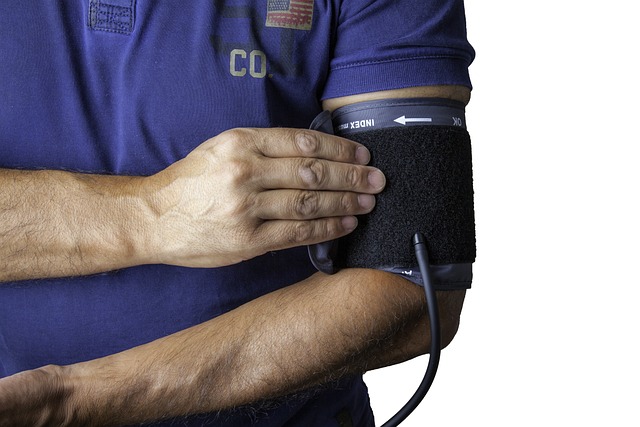The thyroid gland, crucial for metabolism and overall health, requires comprehensive examination in UK patients due to its impact on diverse conditions. A UK standard liver blood test, beyond the typical TSH measurement, includes tests for T3, T4 hormones and lancets/meters for collection & analysis. Normal ranges are 0.4-4.0 mU/L for TSH, 0.7-2.0 ng/dL for T3, and 0.8-1.8 ng/dL for T4; values outside these indicate potential thyroid disorders like hypothyroidism or hyperthyroidism, requiring doctor evaluation.
In the UK, understanding thyroid function is crucial for overall health. A comprehensive thyroid examination kit is essential for patients to monitor their thyroid-stimulating hormone (TSH) levels, ensuring optimal thyroid health. This article explores the components of a standard UK thyroid exam kit and provides insights into interpreting test results. By familiarising yourself with these steps, UK patients can actively manage their thyroid conditions and maintain a vibrant, healthy lifestyle, starting with a simple blood test.
- Understanding Thyroid Function: Why UK Patients Need a Comprehensive Kit
- Components of a Standard Thyroid Examination Kit for UK Patients
- How to Interpret Results from Your UK Thyroid Blood Test
Understanding Thyroid Function: Why UK Patients Need a Comprehensive Kit
Understanding Thyroid Function: Why UK Patients Need a Comprehensive Kit
The thyroid gland, nestled in the neck, plays a vital role in regulating metabolism and overall health. It produces hormones that influence almost every cell in our bodies. For UK patients, understanding thyroid function is crucial because an imbalance can lead to various health issues, from fatigue and weight gain to heart problems and even depression. A comprehensive thyroid examination kit is therefore essential for accurate diagnosis and effective management.
In the UK, many general practitioners (GPs) offer a standard liver blood test as part of routine health checks, which includes measuring thyroid-stimulating hormone (TSH). However, a complete thyroid panel goes beyond TSH, providing insights into levels of thyroxine (T4) and triiodothyronine (T3), the primary hormones produced by the thyroid. This comprehensive kit allows for early detection of thyroid disorders such as hypothyroidism or hyperthyroidism, enabling UK patients to receive timely treatment and avoid potential complications associated with long-term thyroid imbalances.
Components of a Standard Thyroid Examination Kit for UK Patients
A standard thyroid examination kit for UK patients typically includes a range of essential components designed to facilitate accurate diagnosis and assessment of thyroid function. At the core, it features a comprehensive set of test strips or reagents that allow for the measurement of key thyroid hormones such as T3, T4, and TSH (Thyroid-Stimulating Hormone). These strips are often paired with a digital or traditional meter for precise reading of hormone levels in the blood.
Additionally, the kit may incorporate other crucial elements like collection vials with labels for different hormone markers, disposable lancets for blood sampling, and instructions tailored to UK healthcare standards. Some advanced kits might even include tools for interpreting results and guiding next steps based on the patient’s thyroid profile, aligning with the guidelines of the National Health Service (NHS) or other relevant medical bodies in the UK. These components collectively enable healthcare professionals to perform a UK standard liver blood test, ensuring optimal thyroid health management for patients across the country.
How to Interpret Results from Your UK Thyroid Blood Test
After your UK thyroid blood test, interpreting the results is a crucial step to understand your thyroid function. The most commonly checked markers in a standard liver blood test for thyroid health include TSH (Thyroid Stimulating Hormone), T3 (Triiodothyronine), and T4 (Tyroxine). Normal ranges vary slightly between labs but generally: a TSH level within 0.4-4.0 mU/L is considered normal, T3 levels typically fall between 0.7-2.0 ng/dL, and T4 levels range from 0.8-1.8 ng/dL.
If your results are outside these ranges, it could indicate thyroid disorders such as hypothyroidism (low thyroid function), hyperthyroidism (overactive thyroid), or subclinical thyroid conditions. Your doctor will use these results in conjunction with other factors and symptoms to determine the next steps. For instance, a raised TSH might suggest hypothyroidism while elevated T3 and T4 levels could point to hyperthyroidism.
For UK patients, access to a comprehensive thyroid examination kit is essential for maintaining optimal thyroid health. By understanding the key components and interpreting test results accurately, individuals can take an active role in managing their thyroid function. A thorough assessment, including a UK standard liver blood test, empowers patients to make informed decisions about their well-being and seek necessary medical interventions early on.
